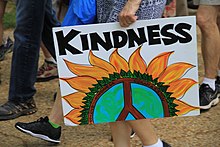
Back Goedhartigheid Afrikaans طيبة Arabic Xeyirxahlıq Azerbaijani Boot BCL Доброта Bulgarian দয়া Bengali/Bangla Amabilitat Catalan Přejícnost Czech Freundlichkeit German Afableco Esperanto


| Part of a series on |
| Emotions |
|---|
  |
Kindness is a type of behavior marked by acts of generosity, consideration, rendering assistance, or concern for others, without expecting praise or reward in return. It is a subject of interest in philosophy, religion, and psychology.
In Book II of Rhetoric, Aristotle defines kindness as "helpfulness towards someone in need, not in return for anything, nor for the advantage of the helper himself, but for that of the person helped".[1] Friedrich Nietzsche considered kindness and love to be the "most curative herbs and agents in human intercourse".[2] Kindness is one of the Knightly Virtues.[3] In Meher Baba's teachings, God is synonymous with kindness: "God is so kind that it is impossible to imagine His unbounded kindness!"[4]
- ^ Aristotle. Rhetoric. Translated by Roberts, W. Rhys. Book 2, chapter 7. Archived from the original on December 13, 2004. Retrieved 2005-11-22.
- ^ Nietzsche, Friedrich Wilhelm (1996) [1878]. "On the History of Moral Feelings". Menschliches, Allzumenschiles [Human, all too human: a book for free spirits]. Translated by Faber, Marion; Lehman, Stephen. University of Nebraska Press. Aphorism 48.
- ^ Singla, Parvesh. "Character". The Manual of Life: Understanding Karma/Right Action. Parvesh singla – via Google Books.[page needed][self-published source?]
- ^ Kalchuri, Bhau (1986). Meher Prabhu: Lord Meher. Vol. 11. Myrtle Beach: Manifestation, Inc. p. 3918.